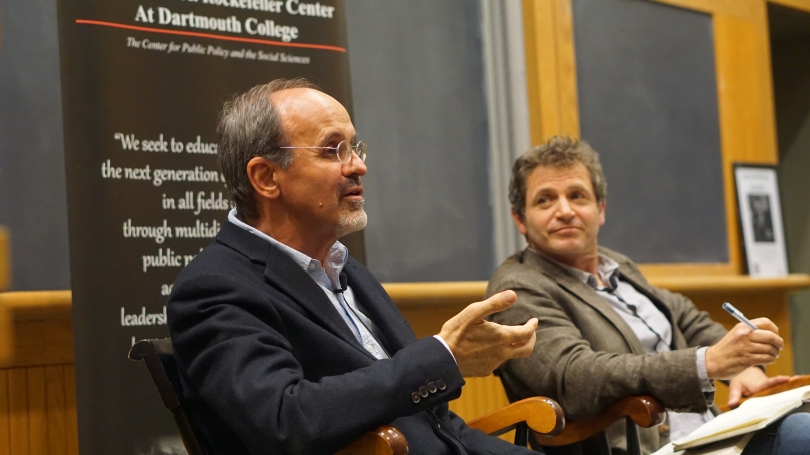
- Public Policy
- Leadership
- Funding
- News & Events
- About the Center
Back to Top Nav
Back to Top Nav
Back to Top Nav
Back to Top Nav
Before he became Associate Justice of the Supreme Court of Namibia, Justice David Smuts played a key role in dismantling the apartheid system in Namibia. On October 14th, 2019, Justice Smuts gave a lecture at the Nelson A. Rockefeller Center, co-sponsored by the Department of English and Creative Writing. During the lecture, entitled “Dark Days to a Brighter Future,” Justice Smuts reflected on his experience with social justice and apartheid and read passages from his memoir, Death, Detention, and Disappearance: One Lawyer’s Battle to hold Power to Account in 1980’s Namibia.
Justice Smuts was introduced by former U.S. Ambassador to Namibia Thomas Daughton and Dartmouth English and Creative Writing Professor Peter Orner, who met Justice Smuts during his time as a Fulbright scholar in Namibia. Daughton described Smuts as a “huge moral authority,” attributing the Namibian constitutional provision banning the death penalty to Namibian leaders’ respect for Smuts. Justice Smuts explained that he told the authors of the Namibian constitution that he would not serve on the Namibian Supreme Court if the constitution allowed for death sentences. He was also instrumental in guaranteeing that the constitution was written in gender-neutral language.
In an interview prior to the event, Justice Smuts said that one of his primary objectives has been building a “human rights culture” in which “people respect human rights and human dignity” and “understand the importance of understanding [their rights] and asserting them.” Such a culture is a far cry from the practices dominant at the time he started practicing law. Namibia was a warzone under martial law imposed by South Africa which governed the country under a mandate dating back to the end of World War I. Throughout the 1980s, political dissenters were tried in “show trials” that almost inevitably resulted in convictions.
Before launching his career in Namibia, Smuts attended law school at Harvard Law School. There, he was inspired by his peers and by “the incredibly fine work done by people in the Civil Rights Movement in the ’50s and ’60s,” he said. After law school, he briefly worked at a corporate firm in Boston. He received an offer to stay, but the job, while well-paying, “didn’t have any social relevance” for him. He felt that his talents were better spent in Namibia, working “to expose some cracks and let some light in.”
He urges Dartmouth students to “make a contribution to their country,” particularly in a time in American history in which “difficulties with accountability” are evident. That being said, he acknowledges that the choice between public service and corporate work can be a difficult one, especially with student loan debt. For him, choosing public service “was far more fulfilling and meaningful.” However, he maintains that the choice between fulfilling work and private sector work doesn’t have to be a choice at all: “you can still do things in [higher-paying] positions that can still give you some fulfillment.”
In spite of his youth and relative lack of experience, Smuts worked to reveal the South African government’s human rights violations in Namibia, particularly torture. It wasn’t easy. He was accused of being a “terrorist collaborator” when he tried to talk to detainees, and there were many times he had to compromise his goals to achieve marginal gains.
He helped establish The Namibian, the first independent newspaper in Namibia and now the largest Namibian newspaper in circulation, in order to expose human rights abuses. In his view, this sort of exposure is vital to a functioning democracy. The paper is published in English, though there are a few pages in Oshiwambo, a major language in Namibia.
Throughout his career, he has noticed that students have been heavily involved in activist efforts. He described young people as “very active and … critical of things” — this gives him hope. And though “the struggle of injustice is different in different parts of the world,” he hopes that Dartmouth students will be inspired by the changes that were fought for, and subsequently achieved, in South Africa. Dartmouth students, he explained, can have a similar impact in the United States, particularly in this “time of turmoil.”
-Written by Eliza Jane Schaeffer ’20, Rockefeller Center Student Program Assistant for Public Programs